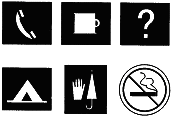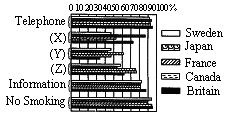题目内容
—How are you getting on with your business?
—I’m glad to say it is _____
- A.turning up
- B.picking up
- C.breaking up
- D.taking up
pick up 恢复,有好转。在此喻指生意兴隆起来。

My mother really knows how to get others to do what she suggests. Besides my father, her neighbors and even a stranger in a grocery store, has fallen under her 36 .
One day we were shopping in a supermarket. When we were passing by the baby aisle(过道), she 37 a young mother browsing through different brands of powdered milk. Her baby was playing with a toy. My mother 38 babies so she went up to the woman and chatted with her.
My mother is an easy person to like. She has the kindest eyes in the world, so it isn’t 39
to trust her. She 40 with the baby a little bit and told the woman about how I used to be cute at that age, too. They laughed together.
The woman was about to put Brand X Milk Powder in her cart when my mother suggested Brand Y 41 because it obviously had better vitamins. Would you believe the woman actually
42 brands just like that?
She really does know how to influence people. But what about her getting other people to
43 whatever she tells them?
My father and I actually had a long conversation about her 44 on how to influence people. According to my father, my mother is just a really likeable person, and she has 45 been
like that, even when he first met her. Chatting people up is natural for her.
During our conversation, I realized that what my mother has is the 46 to build rapport(亲善) with other people. With rapport comes 47 . People are more likely to be influenced by those who they think understand their viewpoints or share their opinions.
| 【小题1】 |
|
| 【小题2】 |
|
| 【小题3】 |
|
| 【小题4】 |
|
| 【小题5】 |
|
| 【小题6】 |
|
| 【小题7】 |
|
| 【小题8】 |
|
| 【小题9】 |
|
| 【小题10】 |
|
| 【小题11】 |
|
| 【小题12】 |
|
I needed to buy a digital camera, one that was simply good at taking good snaps (快照), maybe occasionally for magazines. Being the cautious type, I fancied a reliable brand. So I went on the net, spent 15 minutes reading product reviews on good websites, wrote down the names of three top recommendations and headed for my nearest big friendly camera store. There in the cupboard was one of the cameras on my list. And it was on special offer. Oh joy. I pointed at it and asked an assistant, “Can I have one of those?”? He looked perturbed (不安). “Do you want to try it first?” he said. It didn’t quite sound like a question. “Do I need to?” I replied ,“There is nothing wrong with it?” This made him look a bit insulted and I started to feel bad. “No, no. But you should try it,” he said encouragingly. “Compare it with the others. ”
I looked across at the others: shelves of similar cameras placed along the wall, offering a wide range of slightly different prices and discounts, with each company selling a range of models based around the same basic box. With so many models to choose from, it seemed that I would have to spend hours weighing X against Y, always trying to take Z and possibly H into account at the same time. But when I had finished, I would still have only the same two certainties that I had entered the store with: first, soon after I carried my new camera out of the shop, it would be worth half what I paid for it; and second, my wonderful camera would very quickly be replaced by a new model.
But something in the human soul whispers that you can beat these traps by making the right choice, the clever choice, the wise choice. In the end, I agreed to try the model I had chosen. The assistant seemed a sincere man. So I let him take out of my chosen camera from cupboard, show how it took excellent pictures of my fellow shoppers… and when he started to introduce the special features, I interrupted to ask whether I needed to buy a carry-case and a memory card as well.
Why do we think that new options still offer us anything new? Perhaps it is because they offer an opportunity to avoid facing the fact that our real choices in this culture are far more limited than we would like to imagine.
【小题1】The shop assistant insisted that the writer should________.
| A.try the camera to see if there was anything wrong with it. |
| B.compare the camera he had chosen with the others. |
| C.get more information about different companies. |
| D.trust him and stop asking questions. |
| A.He should get a 50% discount. |
| B.The price of the camera was unreasonably high. |
| C.The quality of the camera was not good. |
| D.The camera would soon fall in value. |
| A.knew very little about it. |
| B.didn’t trust the shop assistant |
| C.wanted to make sure the one he chose would be the best. |
| D.had a special interest in taking pictures of his fellow shoppers. |
| A.people waste too much money on cameras |
| B.cameras have become an important part of our daily life |
| C.we don’t actually need so many choices when buying a product |
| D.famous companies care more about profit than quality |

